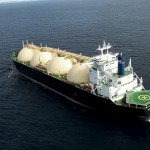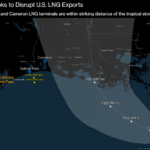This week marked the announcement of plans for a new Liquefied Natural Gas (LNG) plant in Louisiana. The news came yesterday as Venture Global LNG said it would invest $4.0 to $4.5 billion to build a gas liquefaction processing plant and LNG export terminal in Cameron Parish.
The project site will be approximately 203 acres along the Calcasieu Ship Cannel where it meets the Gulf of Mexico. Pending final regulatory approvals, the Calcasieu Pass project will have an export capacity of 10 million metric tons per year of LNG and will accommodate ocean-going vessels with an LNG carrying capacity of up to 185,000 cubic meters (approximately 6.5 MMcf). Also included on the project site will be two full containment LNG storage units.
The new project will create 100 permanent jobs for the community, 326 indirect jobs and 1,500 construction jobs, according to a PR Newswire release.
LNG Abroad
On the other end of the globe, Turkey is considering development of its own LNG plant. Turkey could propose building an LNG terminal in an energy complex on its border with Greece, as part of talks with Russia about a new gas pipeline, reports Reuters.
Last week, Russia decided to cancel plans for its South Stream pipeline project to supply gas to southern Europe, citing EU objections, and instead named Turkey as its preferred partner for an alternative pipeline.
Turkish Energy Minister Taner Yildiz has said, “We have proposals on [the new pipeline] and perhaps including an LNG terminal, the construction of an integrated energy complex could be on the table.”
Demand in Asia Slowing
Even as the U.S. and countries around the world look to build more LNG capacity, demand in Asia, LNG’s largest market, is expected to start dropping off. Asian LNG prices are expected to fall by up to 30% in 2015, according to a survey of analysts and consultants, as the market enters a period of oversupply and the impact of lower oil prices kick in, reports Reuters.
Demand for LNG in the Asian market has begun to slow as nuclear energy comes back online, and certain markets begin to use more coal to meet their energy needs. Asian spot LNG prices have more than halved since the start of the year to reach below $10/MMBtu.
Average import prices into Japan, the world’s largest buyer, are forecast to fall to about $11/MMBtu next year, down from an estimate $15.50 this year and $16.45 in 2013 The drops are forecasted in an environment where Brent crude averages around $75 a barrel, according to David Hewitt, co-head of global oil and gas equity research at Credit Suisse.
Japanese prices are a benchmark for LNG in Asia, a region which accounts for about 70% of global trade.
Important disclosures: The information provided herein is believed to be reliable; however, EnerCom, Inc. makes no representation or warranty as to its completeness or accuracy. EnerCom’s conclusions are based upon information gathered from sources deemed to be reliable. This note is not intended as an offer or solicitation for the purchase or sale of any security or financial instrument of any company mentioned in this note. This note was prepared for general circulation and does not provide investment recommendations specific to individual investors. All readers of the note must make their own investment decisions based upon their specific investment objectives and financial situation utilizing their own financial advisors as they deem necessary. Investors should consider a company’s entire financial and operational structure in making any investment decisions. Past performance of any company discussed in this note should not be taken as an indication or guarantee of future results. EnerCom is a multi-disciplined management consulting services firm that regularly intends to seek business, or currently may be undertaking business, with companies covered on Oil & Gas 360®, and thereby seeks to receive compensation from these companies for its services. In addition, EnerCom, or its principals or employees, may have an economic interest in any of these companies. As a result, readers of EnerCom’s Oil & Gas 360® should be aware that the firm may have a conflict of interest that could affect the objectivity of this note. The company or companies covered in this note did not review the note prior to publication. EnerCom, or its principals or employees, may have an economic interest in any of the companies covered in this report or on Oil & Gas 360®. As a result, readers of EnerCom’s reports or Oil & Gas 360® should be aware that the firm may have a conflict of interest that could affect the objectivity of this report.






